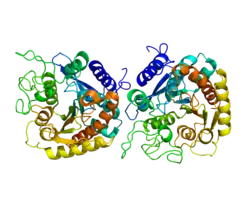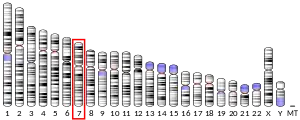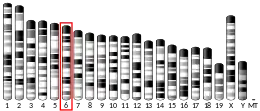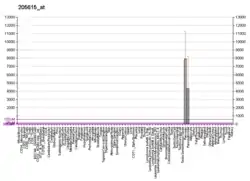Carboxypeptidase A1
Carboxypeptidase A1 is an enzyme that in humans is encoded by the CPA1 gene.[5]
| CPA1 | |||||||||||||||||||||||||||||||||||||||||||||||||||
|---|---|---|---|---|---|---|---|---|---|---|---|---|---|---|---|---|---|---|---|---|---|---|---|---|---|---|---|---|---|---|---|---|---|---|---|---|---|---|---|---|---|---|---|---|---|---|---|---|---|---|---|
 | |||||||||||||||||||||||||||||||||||||||||||||||||||
| |||||||||||||||||||||||||||||||||||||||||||||||||||
| Identifiers | |||||||||||||||||||||||||||||||||||||||||||||||||||
| Aliases | CPA1, CPA, carboxypeptidase A1 | ||||||||||||||||||||||||||||||||||||||||||||||||||
| External IDs | OMIM: 114850 MGI: 88478 HomoloGene: 55609 GeneCards: CPA1 | ||||||||||||||||||||||||||||||||||||||||||||||||||
| |||||||||||||||||||||||||||||||||||||||||||||||||||
| |||||||||||||||||||||||||||||||||||||||||||||||||||
| |||||||||||||||||||||||||||||||||||||||||||||||||||
| |||||||||||||||||||||||||||||||||||||||||||||||||||
| |||||||||||||||||||||||||||||||||||||||||||||||||||
| Wikidata | |||||||||||||||||||||||||||||||||||||||||||||||||||
| |||||||||||||||||||||||||||||||||||||||||||||||||||
Three different forms of human pancreatic procarboxypeptidase A have been isolated. The A1 and A2 forms are monomeric proteins with different biochemical properties. Carboxypeptidase A1 is a monomeric pancreatic exopeptidase. It is involved in zymogen inhibition.[5]
References
- GRCh38: Ensembl release 89: ENSG00000091704 - Ensembl, May 2017
- GRCm38: Ensembl release 89: ENSMUSG00000054446 - Ensembl, May 2017
- "Human PubMed Reference:". National Center for Biotechnology Information, U.S. National Library of Medicine.
- "Mouse PubMed Reference:". National Center for Biotechnology Information, U.S. National Library of Medicine.
- "Entrez Gene: CPA1 carboxypeptidase A1 (pancreatic)".
Further reading
- Catasús L, Villegas V, Pascual R, et al. (1992). "cDNA cloning and sequence analysis of human pancreatic procarboxypeptidase A1". Biochem. J. 287 (1): 299–303. doi:10.1042/bj2870299. PMC 1133158. PMID 1417781.
- Stewart EA, Craik CS, Hake L, Bowcock AM (1990). "Human carboxypeptidase A identifies a BglII RFLP and maps to 7q31-qter". Am. J. Hum. Genet. 46 (4): 795–800. PMC 1683655. PMID 1969228.
- Moulard M, Michon T, Kerfelec B, Chapus C (1990). "Further studies on the human pancreatic binary complexes involving procarboxypeptidase A." FEBS Lett. 261 (1): 179–83. doi:10.1016/0014-5793(90)80665-6. PMID 2307232. S2CID 6705621.
- Pascual R, Burgos FJ, Salva M, et al. (1989). "Purification and properties of five different forms of human procarboxypeptidases". Eur. J. Biochem. 179 (3): 609–16. doi:10.1111/j.1432-1033.1989.tb14590.x. PMID 2920728.
- Honey NK, Sakaguchi AY, Lalley PA, et al. (1986). "Assignment of the gene for carboxypeptidase A to human chromosome 7q22----qter and to mouse chromosome 6". Hum. Genet. 72 (1): 27–31. doi:10.1007/BF00278813. PMID 3455919. S2CID 38300147.
- Velculescu VE, Zhang L, Vogelstein B, Kinzler KW (1995). "Serial analysis of gene expression". Science. 270 (5235): 484–7. Bibcode:1995Sci...270..484V. doi:10.1126/science.270.5235.484. PMID 7570003. S2CID 16281846.
- Laethem RM, Blumenkopf TA, Cory M, et al. (1996). "Expression and characterization of human pancreatic preprocarboxypeptidase A1 and preprocarboxypeptidase A2". Arch. Biochem. Biophys. 332 (1): 8–18. doi:10.1006/abbi.1996.0310. PMID 8806703.
- Bonora E, Bacchelli E, Levy ER, et al. (2002). "Mutation screening and imprinting analysis of four candidate genes for autism in the 7q32 region". Mol. Psychiatry. 7 (3): 289–301. doi:10.1038/sj.mp.4001004. PMID 11920156.
- Strausberg RL, Feingold EA, Grouse LH, et al. (2003). "Generation and initial analysis of more than 15,000 full-length human and mouse cDNA sequences". Proc. Natl. Acad. Sci. U.S.A. 99 (26): 16899–903. Bibcode:2002PNAS...9916899M. doi:10.1073/pnas.242603899. PMC 139241. PMID 12477932.
- Scherer SW, Cheung J, MacDonald JR, et al. (2003). "Human chromosome 7: DNA sequence and biology". Science. 300 (5620): 767–72. Bibcode:2003Sci...300..767S. doi:10.1126/science.1083423. PMC 2882961. PMID 12690205.
- Gerhard DS, Wagner L, Feingold EA, et al. (2004). "The status, quality, and expansion of the NIH full-length cDNA project: the Mammalian Gene Collection (MGC)". Genome Res. 14 (10B): 2121–7. doi:10.1101/gr.2596504. PMC 528928. PMID 15489334.
External links
- The MEROPS online database for peptidases and their inhibitors: M14.001
- Overview of all the structural information available in the PDB for UniProt: P15085 (Carboxypeptidase A1) at the PDBe-KB.
This article is issued from Wikipedia. The text is licensed under Creative Commons - Attribution - Sharealike. Additional terms may apply for the media files.




